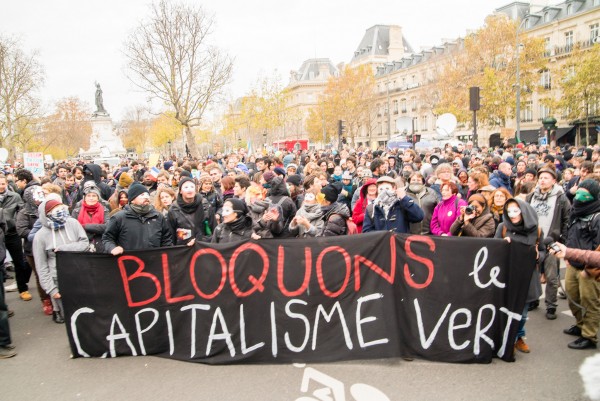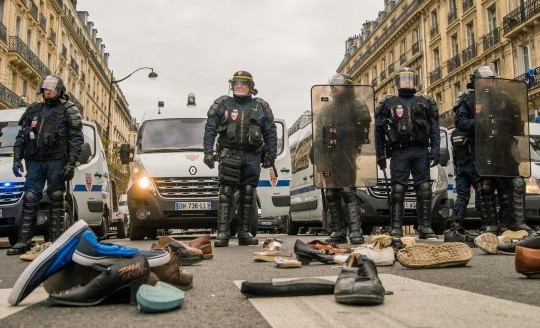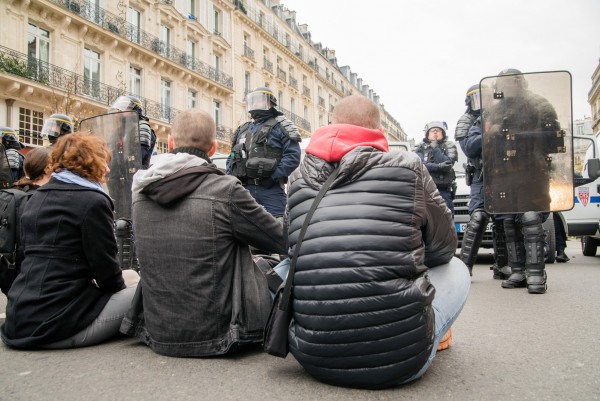Above Photo: By Duc
The cowardly response of prominent climate organizations like 350.org and Avaaz to the protest ban during COP21 demands accountability.
In the wake of ISIS’ attacks on Paris, French authorities jumped on the opportunity to revoke permits for the Global Climate March, a well-planned series of demonstrations scheduled to coincide with international climate talks. After speculation around the fate of the demonstrations, several prominent groups including 350.org and Avaaz gave in and announced that the march was canceled, while key grassroots groups announced they would take to the streets despite the ban.
These differing responses expose a long-standing divide between mainstream NGOs and grassroots groups in the climate justice movement and highlight conflicts about how the movement negotiates with power and demonstrates solidarity in the face of crisis. With time running out to secure a livable planet and many more high-stakes decisions to be made going forward, we cannot afford to let these conflicts continue to go unresolved. It is clear now that the movement requires nothing short of an internal revolution.
Historically, high-level international meetings like the Paris Climate Conference (COP21) have resulted in abstract proclamations and shiny photo-ops, while dirty energy policies continue to accelerate levels of carbon past the threshold that will raise global temperatures to a dangerous and likely irreversible degree.
Despite hosting delegates from nearly every country and claiming to seek a binding cap on emissions, the UN Framework on Climate Change has no teeth. Deals that will impact literally everyone on earth — involving policies that are a matter of life and death for hundreds of millions of people on the “front lines” of climate disasters — are being cut by the same corporations and governments that have caused and profited from climate change.
The high-profile meetings represent the best governments can do to remedy climate change while leaving global power structures intact. As such they serve as opportunities for the movement to highlight the huge disconnect between the causes and severity of the climate crisis and the solutions proposed by a capitalist world system. Accordingly, movements called for unprecedented action at COP21 to force our voices into the conversation and remind the delegations where power ultimately lies.
Despite the supposed cancelation, many grassroots groups announced that the French government’s ban on protest — which had nothing to do with fighting terrorism — would not deter them. On November 29, activists took to the streets for climate justice, and the same government that is hosting the Climate Conference responded by attacking, tear gassing, and arresting hundreds of protesters.
HOW NOT TO DO CIVIL RESISTANCE
If the goal of mainstream groups in canceling the march was to ensure the safety of the public, they failed. Both experience and research in civil resistance tell us that our best bet against fear, intimidation and repression is to increase(not decrease!) participation. It is difficult to imagine the French government successfully arresting and detaining 400,000 people, the number originally expected to participate in the Paris march. Instead, hundreds of the 10,000 or so who demonstrated on November 29 became easy targets for arrest and violent repression by the French police.
It is well established that social movements win by polarizing the public andexercising non-cooperation to weaken and undermine power structures. Canceling the march did the opposite of these things. It demobilized would-be participants, shrank away from an opportunity to generate outrage over the French government’s cynical efforts to subdue the movement after the Paris attack, and sent a message that the movement is willing to back down in high-stakes scenarios as soon as it meets opposition.
Beyond failing to apply these core strategic principles, the groups that called off the march forfeited a unique opportunity to connect imperialism and neocolonialism with climate change, and escalate as an interconnected movement against war, racism, and fossil fuels.
Attempting to cancel the march was not only a strategic mistake, it was a betrayal. It validated the French government’s attacks on protesters and it left the activists who boldly carried on with planned actions without much-needed organizational support. In the wake of events like the Paris attacks, we have a moral obligation to make meaning of the violence we see and its root causes. We should not allow the interests that are profiting from war to frame the response and set the political agenda.
This example is a case study in the ways power imbalances in NGOs reinforce systemic hierarchies and hurt movements. Beyond that, it provides a window into civil resistance in a climate-changed world. Resource wars, violence and social instability are expected to increase as the planet warms. This will not be the last time the movement needs to make a tough strategic decision with terrorism and xenophobia looming in the background.
The decision to cancel the Paris climate march sets a bad precedent, and with the stakes as high as they are we can’t afford to let the issues that caused it go unaddressed.
NONPROFITS VERSUS SOCIAL MOVEMENTS
The tension between corporatized nonprofits and grassroots groups is not new, but the consequences are getting more serious. The mounting realities of climate change create a new sense of urgency for the climate movement.
The US provides a good example. Throughout the history of its environmental movement, most of the organizing priorities have been set by “big green” environmental groups like the Sierra Club and the National Resources Defense Council. Overwhelmingly led by wealthy white men (historically and to this day), these groups have lacked the perspective and will to draw connections between environmental degradation, racism, sexism, inequality and other social injustices. They are also known for having ill-conceived ideas about challenging institutional power.
Author Naomi Klein has argued that many big green environmental groups pose an even greater threat to the planet than climate deniers because of their willingness to cooperate with corporate polluters and even invest in fossil fuels.
Groups like 350.org suffer from the same lack of perspective as older big greens, with leadership that poorly reflects the diverse communities most impacted by climate change. While they are not in bed with the fossil fuel industry, they demonstrate a hauntingly familiar weakness in power analysis and lack coherent long-term strategies.
Big nonprofits like 350.org and Avaaz also command tremendous resources and communications infrastructure. These things are not inherently bad, but they must be leveraged as tools to uplift and amplify grassroots work, rather than drown out grassroots voices.
Curiously, some of the decision-making groups composing the Mobilization Support Team of thePeople’s Climate Movement (one of the platforms used to announce that the Paris march was cancelled) released statements disregarding the French government’s ban on protest.
Several of these Environmental Justice groups and others under the banner of the It Takes Roots delegation released an inspiring statement that they would continue to protest in Paris despite the ban. Additional groups openly defied the ban, including Rising Tide North America and the Climate Games (a Paris-based civil disobedience platform).
Naomi Klein, as an influential voice on climate change and global justice, called out the French government’s crackdown on protest while demonstrating alongside other activists. The widely conflicting actions and public statements of several key groups and leaders raise big questions about how the decision to cancel the march was made in the first place.
WE NEED A CLIMATE MOVEMENT THAT CAN (ACTUALLY) WIN
Civil resistance is contentious by nature. It can include activities that vary widely in tone, from righteous anger to outright silliness, but the key to effective action is confronting oppressive power structures in one way or another.
The emergency security powers the US legislature granted the government after 9/11 under the Patriot Act are now widely understood to have been, at least in large part, a cynical power grab by security forces. This lesson appears to have been lost on the leadership of organizations like 350.org and Avaaz.
Predictably, French authorities used sweeping emergency powers to crack down on climate demonstrators, preemptively placing dozens of organizers under house arrest leading up to the conference. Groups like 350.org, Avaaz, and others that sheepishly accepted the French government’s ban on protest were complicit in an effort to quell dissent and reinforce state power when they could have challenged or undermined it.
How would the French authorities have responded on November 29 if groups like 350.org and Avaaz had instead announced that the march would not be cancelled; if there were hundreds of thousands of people in the streets instead of thousands? We can only speculate on how this could have influenced the political weather in Paris and worldwide, how it could have increased public awareness around the negotiations, or put pressure on decision makers to act in the interest of the people.
The important thing now is to move forward as a movement in a way that will allow us to fight for the change we need. We cannot allow opaque, top-down decision making to shape the future of our planet.
People’s lives depend on what movements are doing. Literally everyone’s lives depend on climate action, and for frontline communities this is the case in a very immediate sense. Yet big green nonprofits attempt to play nice with the corporations poisoning the atmosphere and the governments who actively impede the kind of progress that is urgently required.
Fossil fuel companies are not taking a break from their business in respect for the Parisian casualties. The French government did not attempt to cancel or move COP21 due to security concerns. Conservatives are not taking time off from pushing their hateful narratives against refugees.
If we take a metaphoric moment of silence in our opposition to climate change every time there is a crisis (and there is always a crisis somewhere) while the agents of climate change march forward undeterred, we become their allies in shaping the future of the planet.
Without popular movements aggressively leveraging people power, the result of these international talks will always be insufficient. After endless arguing and negotiating, governments and corporations will agree on non-binding or unenforceable resolutions that will leave power and profits in the hands of those who are destroying the planet. Absent our pressure, no amount of high-profile meetings will result in the outcomes we need.
This is a moment of reckoning. Without significant changes, we can only expect to witness more bad decisions with increasingly serious consequences. If the leadership of major nonprofits associated with the climate movement is unable or unwilling to lead the type of radical action our moment requires, if it makes decisions for the movement behind closed doors and absent strategic or moral grounding, if it is unaccountable to frontline communities and organizations, then we need new leadership altogether.




